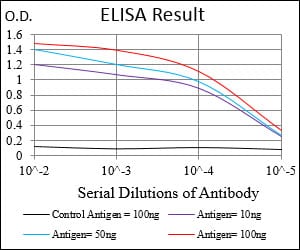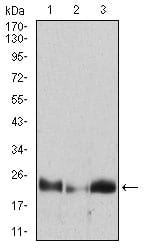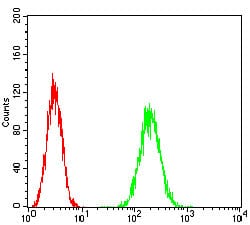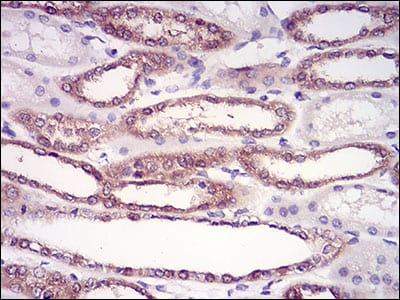



| WB | 咨询技术 | Human,Mouse,Rat |
| IF | 咨询技术 | Human,Mouse,Rat |
| IHC | 1/25-1/100 | Human,Mouse,Rat |
| ICC | 技术咨询 | Human,Mouse,Rat |
| FCM | 咨询技术 | Human,Mouse,Rat |
| Elisa | 1/1000-1/5000 | Human,Mouse,Rat |
| Aliases | HPRT; HGPRT |
| Entrez GeneID | 3251 |
| clone | 5F11A7 |
| WB Predicted band size | 24.6kDa |
| Host/Isotype | Mouse IgG1 |
| Antibody Type | Primary antibody |
| Storage | Store at 4°C short term. Aliquot and store at -20°C long term. Avoid freeze/thaw cycles. |
| Species Reactivity | Human |
| Immunogen | Purified recombinant fragment of human HPRT1 (AA: FULL(1-218)) expressed in E. Coli. |
| Formulation | Purified antibody in PBS with 0.05% sodium azide. |
+ +
以下是3篇与KLK7抗体相关的研究文献概览:
---
1. **文献名称**:*"Kallikrein-related peptidase 7 (KLK7) is a protease involved in stratum corneum desquamation"*
**作者**:Caubet C. et al.
**摘要**:研究揭示了KLK7通过降解细胞间黏附蛋白(如corneodesmosin)介导皮肤角质层脱落,并开发了特异性抗体用于检测其在表皮中的活性,为皮肤屏障功能研究提供工具。
---
2. **文献名称**:*"Human kallikrein 7 (hK7) as a potential biomarker for ovarian carcinoma"*
**作者**:Borgono C.A. et al.
**摘要**:通过免疫组化验证KLK7抗体在卵巢癌组织中的高表达,提出KLK7可作为卵巢癌诊断或预后的生物标志物,并探讨其促进肿瘤侵袭的机制。
---
3. **文献名称**:*"A monoclonal antibody targeting kallikrein 7 inhibits psoriasis-like skin inflammation in mice"*
**作者**:Schmutzler C. et al.
**摘要**:开发了靶向KLK7的单克隆抗体,证明其通过抑制蛋白酶活性减轻小鼠银屑病模型的皮肤炎症,为治疗过度脱屑性疾病提供潜在策略。
---
4. **文献名称**:*"Kallikrein-mediated proteolysis regulates the pathogenesis of Netherton syndrome"*
**作者**:Yamasaki K. et al.
**摘要**:利用抗体检测发现Netherton综合征患者皮肤中KLK7异常活化,揭示KLK7抑制剂LEKTI缺失导致蛋白酶活性失控,加剧皮肤屏障破坏和炎症。
---
这些研究涵盖了KLK7抗体的诊断、治疗及机制探索,涉及皮肤病、癌症等领域。如需具体文献来源,可进一步通过PubMed或期刊官网检索。
The KLK7 antibody targets kallikrein-related peptidase 7 (KLK7), a serine protease encoded by the *KLK7* gene. Part of the human tissue kallikrein family, KLK7 plays a role in desquamation (skin shedding) by cleaving extracellular matrix proteins like corneodesmosomes, aiding epidermal renewal. It is primarily expressed in skin, but also detected in ovarian, breast, and gastrointestinal tissues. Dysregulated KLK7 activity is linked to pathological conditions, including psoriasis, atopic dermatitis, and cancer progression, where its overexpression may promote tumor invasion and metastasis by degrading adhesion molecules or activating protease-activated receptors (PARs).
KLK7 antibodies are essential tools for detecting protein expression in research and diagnostics. Monoclonal and polyclonal variants are used in techniques like immunohistochemistry, ELISA, and Western blot to study KLK7's role in disease mechanisms. Therapeutic applications are under exploration, with inhibitors and antibody-based strategies aiming to modulate KLK7 activity in inflammatory skin disorders or cancers. However, challenges remain in specificity and off-target effects due to structural similarities among kallikreins. Ongoing studies focus on refining antibody design to improve clinical relevance, positioning KLK7 as both a biomarker and a potential therapeutic target.
×